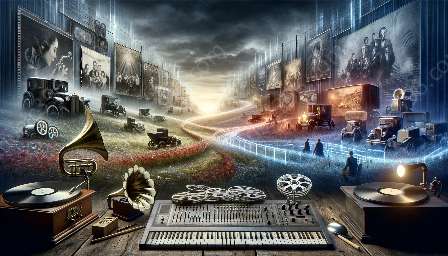Soundtracks play a pivotal role in stage plays and musicals, influencing audience psychology. This topic cluster explores the influence of soundtracks on audience perception and emotions, and the interplay between music and psychological responses.
The Power of Soundtracks: A Key Element in Stage Plays and Musicals
Soundtracks are an integral part of the theater experience, shaping the audience's emotional journey and enhancing the storytelling process. Whether it's a soaring musical number or a subtle background melody, soundtracks have the ability to evoke powerful emotions and create immersive atmospheres.
Creating Emotional Resonance
Soundtracks serve as a powerful tool for creating emotional resonance with the audience. Through carefully selected music and lyrics, composers and directors can elicit specific psychological responses from the viewers. Whether it's a heart-wrenching ballad or an uplifting ensemble number, the soundtrack sets the emotional tone and establishes a deep connection with the audience.
Enhancing Narrative Engagement
Moreover, soundtracks enhance the narrative engagement of the audience, guiding their psychological focus and intensifying their immersion in the storyline. By effectively coordinating music with dramatic moments, stage plays and musicals can heighten the audience's emotional investment and captivate their attention.
The Impact of Audience Psychology on Soundtrack Perception
Understanding audience psychology is essential for crafting impactful soundtracks that resonate with viewers on a psychological level. By comprehending the cognitive and emotional processes at play, composers and directors can tailor soundtracks to align with audience expectations and desires.
Emotional Contagion and Musical Influence
Emotional contagion, a psychological phenomenon in which individuals synchronize their emotions with those expressed in music, plays a significant role in the reception of soundtracks. Composers and creators leverage this phenomenon to elicit specific emotional responses in the audience, leveraging the power of music to influence psychological states.
Psychological Association and Memory Formation
Furthermore, audience psychology influences the formation of psychological associations with specific musical motifs and themes. By strategically employing recurring musical motifs, composers can trigger memory formation and emotional recall in the audience, reinforcing the psychological impact of the soundtrack.
The Interplay of Music, Emotions, and Audience Experience
The interplay between music, emotions, and the audience experience in stage plays and musicals is a captivating subject of study. It delves into the intricate ways in which soundtracks shape psychological responses, evoke emotions, and enrich the overall experience for viewers.
Emotional Triggers and Resonance
Soundtracks function as emotional triggers, effectively evoking specific emotions in the audience and creating resonance through music. By strategically employing music to tap into universal emotional themes, stage plays and musicals can resonate with diverse audience segments, fostering a deep psychological connection.
Psychophysiological Responses to Music
Research has revealed the psychophysiological responses of individuals to music, shedding light on the intricate interplay between music and human emotions. By analyzing physiological changes, such as heart rate and skin conductance, in response to different soundtracks, creators can gain insights into the psychological impact of music on the audience.
Conclusion
In summary, the relationship between soundtracks and audience psychology in stage plays and musicals is an enthralling area of exploration. The influence of soundtracks on audience emotions and perceptions, complemented by an understanding of audience psychology, is crucial for creating impactful and memorable theatrical experiences. This cluster offers a glimpse into the profound connection between music, emotions, and the psychology of the audience, highlighting the multifaceted impact of soundtracks in live performances.





















